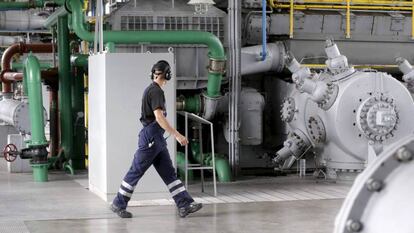Latvia: can’t live with Russia, can’t live without her
Only country in EU that is 100% dependent on Russia for gas supply is set to liberalize market


Latvia is facing a dilemma. The only country in the EU entirely dependent on Russia for its natural gas supplies, this small Baltic state will open up its natural gas market on April 3, enabling it to finally benefit from other energy sources and break free from Moscow. But the move could have serious repercussions, with independence coming at a price.
In this corner of the EU, winters are long and the homes of its two million residents need to be heated for longer. Toward the end of March, an incessant blizzard blows snow onto the highway that connects Riga, the capital, with the rest of the country. An hour-and-a-half from Riga on a train that dates from the Cold War, hidden among the pines of Inčukalna, is the only underground gas-storage facility in the Baltic region, considered a national treasure since its construction under the Soviets in 1968, according to Andra Ješinska, director at Conexus Baltic Grid.
This is the company that has been managing the country’s infrastructure and pipelines since the beginning of the year while the private firm Latvijas Gāze controls the gas flow. But it is the Russian giant Gazprom that owns the largest stake in both companies (34%) as well having a contract to exclusively supply the private firm Latvijas Gāze until 2030, despite the imminent opening of the market, a move triggered by the EU’s commitment to an Energy Union.
Politically there is a certain disquiet with regard to a possible Russian cut in supply
Martins Kaprans, University of Latvia
This contract will undoubtedly make it more difficult for smaller companies to get a foothold in the market, leaving it as is – largely in the hands of Gazprom, says Sebastian Gröblinghoff, Vice President of Latvijas Gāze. “Adjustments to the agreement [with the Russians] will be necessary if Latvia is to prove attractive to the rest of the world,” he says.
Both the EU and Latvia are keen to shake free of Russia – relations between Latvia and Russia have been tense since Russia annexed Crimea in 2014. But though Latvia is not scared of its neighbor, it is concerned. “Politically there is a certain disquiet with regard to a possible cut in supply, but we have to trust in Russian common sense because gas is a business,” says Martins Kaprans, an expert at the University of Latvia.
The Russians have shown themselves to be reliable on a business level according to Gröblinghoff, who doesn’t give too much weight to the threat of a supply cut, such as those carried out by Russian President Vladimir Putin in 2006 and 2009 when he turned off the gas to the Ukraine, something not forgotten by the people of Latvia.
The Spanish European Commissioner for Energy, Miguel Arias Cañete, is of a different opinion. He remembers the problems in Europe when Russia turned off the tap and reveals that Brussels aims for each country to have access to three different sources of energy.
But if there were a boycott or a cancellation of the contract with Gazprom or even a simple infrastructure problem, the population’s supply would be guaranteed for 18 months, thanks to the Inčukalna underground-storage facility. “Five months, if we had to supply neighboring countries,” says Reinis Āboltiņš, a researcher at Latvia’s only think tank, Providus.
Prices will go up because we’ll have to add the cost of transit and storage to gas not coming from Russia Andra Ješinska, Conexus Baltic Grid director
Diaga Bluke, 47, a local Latvian resident, is clear that he would rather pay more to heat his home than be dependent on Russia. “Moscow can use gas as a means of putting pressure on us and that’s not normal,” he says.
But the country’s economics minister, Arvils Ašeradens, is keen to talk down such concerns among Latvians as fueled by Russian propaganda and “fake news.”
His government, he says, has “emergency measures” lined up, such as agreements with Norway, Qatar and the US in the event that Russia cuts off supply. All well and good, but Norway’s reserves stand at 1.9 billion cubic meters compared to Russia’s 47 billion cubic meters controlled by Russia, the country with the most natural gas in the world, according to the European Commission.
Brussels has made it clear that European production will drop by 50% in the next 20 years while consumption will remain stable, which means an increasing amount of gas will have to be imported from non-EU countries. But the Spanish Commissioner is confident that new finds in Egypt, Cyprus and Israel will make up for the shortfall.
A Baltic market?
Latvia already has an eye on business opportunities that will arise when the market opens, such as selling its neighbors the gas stored at the Inčukalna storage facility. The facility has the capacity to store 2.4 billion cubic meters and annual consumption in the country is less than 1.3 billion cubic meters, according to official data.
“Once the gas is at the facility, it’s ours and we’ll sell it as we wish [in an open market]” says Gröblinghoff, from Latvijas Gāze, who believes the most sensible way forward is an alliance between the three Baltic countries [Estonia, Latvia and Lithuania] and Finland, working within the Energy Union that has 28 members – or 27 if you take out the United Kingdom.
April 3, 2017 is a red letter day for Latvia’s political and economic calendars
Latvia has good reason to favor the Energy Union and stop operating in isolation, but the idea of setting up a purely Baltic market is even more attractive and one that is supported by both the government and the opposition.
The proposed project known as the Balticconnector – already signed by Helsinki, Tallín, Riga and Vilna – would give the region more independence from Russia while continuing to link it with the EU through liquefied natural gas (LNG) terminals. There is already an LNG terminal in Klaipėda in Lithuania and in Estonia while Finland has plans to build an underwater gas transmission pipeline across the 87 kilometers of sea in the Gulf of Finland that separates it from Estonia. “If we join forces, we can create an interesting market,” says Ašeradens.
April 3, 2017, is therefore a red letter day for Latvia’s political and economic calendar. But while the conservative government is convinced that creating more competition will bring prices down, not everyone agrees. “I’m skeptical,” says Ivars Zariņš, an opposition politician.
The director of Conexus Baltic Grid also expresses doubts. “The prices will go up because we’ll have to add the cost of transit and storage to any gas not coming from Russia,” he says. But Cañete, the Spanish commissioner, prefers to look on the bright side. “Competition is good,” he says without elaborating.
However the situation develops, Gazprom is set to control Latvia’s gas at least until 2030. As Ivars Zariņš says, “It’s difficult with Russia but impossible without her.”
English version by Heather Galloway.